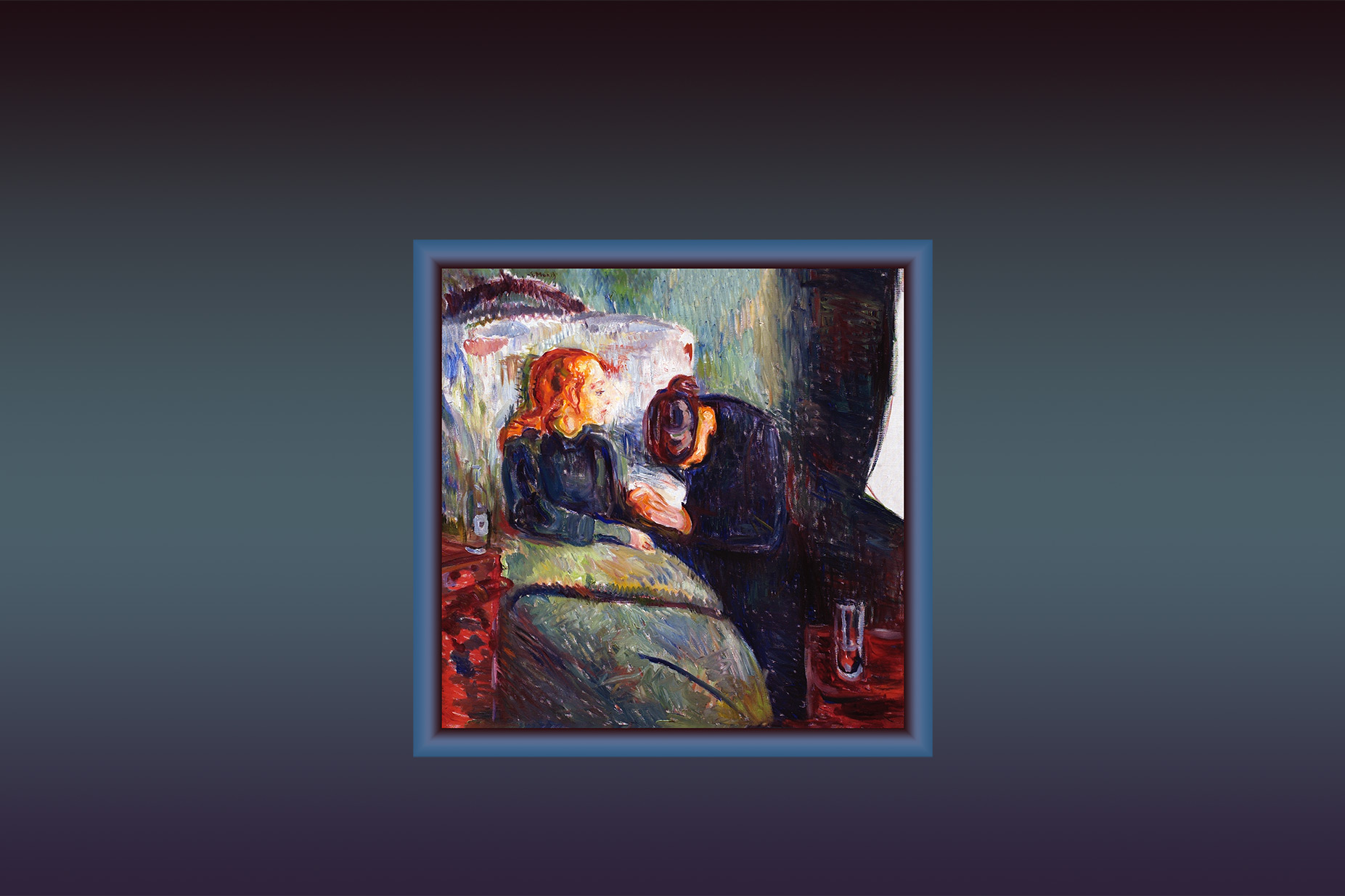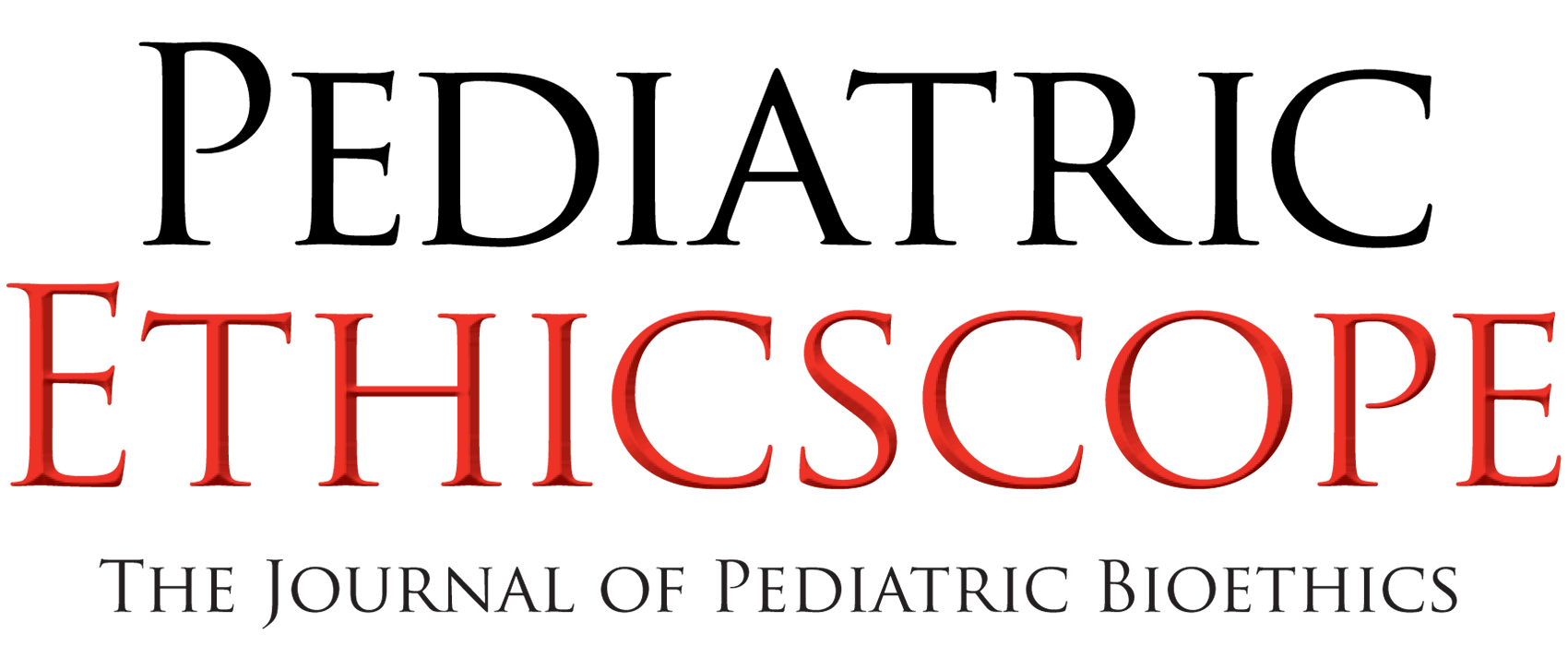
White Space
Stowe Locke Teti, Tomas Jose Silber
White Space
ABOUT THE COVER
Abstract
This issue, volume 32 number 2, addresses different dimensions of and viewpoints on suffering; physical, psychological, anthropological, and philosophical, from the perspectives of patients, their families, and those who care for them. For the cover of this issue we selected Edvard Munch’s The Sick Child. It is a tragic rendition of a mother’s suffering and despair for her sick, dying child. The child’s pained, enervated gaze conveys a resignation for what is to come—both for herself, and her mother. In spite of its darkness, the, silent, poignant dyad is suffused with vibrant, lively colors, redolent of unseen tears for what will not be. The painting depicts a moment before the death of Munch’s older sister, Joanne Sophie, from tuberculosis at age 15. Munch revisited this traumatic event from his childhood numerous times over many years and painted several versions; the version shown is from 1925.
VIEW / DOWNLOAD PDF
Pending publication of print/PDF version.
White Space
White Space
Announcements
We have introduced a number of new elements to the Pediatric Ethicscope website over the past several weeks. These changes were prompted by several requests from readers, and most of the changes are aimed at aiding readers wanting to cite and download Pediatric Ethicscope articles for research or teaching purposes. Before turning to the articles in this issue, we will cover the changes afoot—there are four announcements enumerated below, each with an explanation of the new functionality.
The New “In Press” Section
The most obvious is the new “In Press” section of the homepage, which allows us to put out electronic publications (Epubs) not just ahead of prints (as we’ve done for some time) but also before the rest of the issue is ready to go to press. The first article, “Pierre in the Clinic” is already up, and the remaining articles in this issue will follow as each becomes available. This allows us to publish articles several months more quickly than we have in the past. Due to this change, this and future editorials will not be finalized as the version of record until all articles are posted.
PDFs of Articles and Issues Now Available for Viewing and Download
The second change is new article functionality that allows readers to scroll through, view full size, or download the print version as a PDF without leaving the article page. This feature resides in the box immediately below the abstract pulldown for each article. The PDF will not be immediately available for the Epubs, but will be added once the print version is ready to go to press. We have added this PDF viewing and downloading functionality to the Archives page as well; the print versions of volume 30 number 2 and volume 31 number 1 are both available for viewing and download, and subsequent issues will be added as they become available.
The “Call for Papers” Section on the Homepage
We would also like to draw your attention to the new “Call for Papers” section in the top of the right bar of the homepage. While Pediatric Ethicscope accepts articles on a continuous basis on all subjects within our scope, the call for papers section will announce subjects around which we are actively preparing issues. In responding to the call, authors may submit a completed manuscript, a draft manuscript, or an abstract. While abstract submissions in themselves cannot be approved for publication prior to the evaluation and review of a manuscript, the editors will provide feedback on the project and guidance as to the anticipated level of reader interest. The call for papers themselves may be interpreted broadly; contact the journal if you have any questions.
DOI Number Registration for Articles
The final development we would like to announce is Pediatric Ethicscope’s Crossref registration, which allows the journal to assign DOI numbers to all articles we publish. DOIs are of benefit to both authors and readers; for authors, since DOI numbers can be tracked across platforms and remain constant (unlike citations) accurate readership and citation data is available. The journal will be adding functionality to track reads, shares, and citations in the coming year. DOI numbers benefit readers by making articles easier to locate and, when there are multiple versions, identify authoritatively. We encourage researchers to use DOI numbers in their citations in general, and as part of our agreement with Crossref, all citations need to include a DOI if one is available. Most styles allow for the DOI number to simply be appended to the end of the citation (including Pediatric Ethicscope).
White Space
The Issue
With that business taken care of, we would like to turn to the issue’s content. The first article in this issue, the aforementioned “Pierre in the Clinic,” by Aaron Wightman, Tyler Tate, and Georgina Campelia. The authors propose the use of a care ethic in cases where adolescents refuse to accept needed therapies. They point out the difficulty this poses for clinicians; the patient needs help, but won’t accept it—often out of an age-appropriate need to rebel, turning a normal right of passage into a potentially life-threatening gauntlet. While the adolescent may be averse to treatment, the clinician is all but helpless to act in her benefit. This inability to render care to those in need challenges the what Cassel calls the “intactness of the person as a complex social and psychological entity.” [1] The result, according to Cassel, is suffering on the part of the clinician.
White Space
In the following weeks, this editorial will be expanded to address more articles as each is released. We hope you find this format both more useful and user-friendly.
White Space
White Space
White Space

This work is licensed under a Creative Commons Attribution-NonCommercial-ShareAlike 4.0 International License.
The authors have disclosed no conflicts of interest.
White Space
White Space
Affiliations
Stowe Locke Teti HEC-C1
Tomas Jose Silber MD, MaSS2
- Executive Editor, Pediatric Ethicscope
Center for Bioethics, Harvard Medical School - Editor-in-Chief, Pediatric Ethicscope
- Children’s National Medical Center
Correspondence
Stowe Locke Teti, HEC-C
Core Faculty, Lecturer on Global Health and Social Medicine
Editor-in-Chief, Harvard Medical School Bioethics Journal
Executive Editor, Pediatric Ethicscope
Center for Bioethics
Harvard Medical School
641 Huntington Avenue
Boston, MA 02115
White Space
White Space
Endnotes
1 Cassel EJ. The nature of suffering and the goals of medicine. N Engl J Med. 1982 Mar 18;306(11):639-45.
